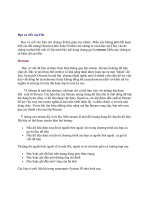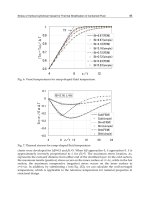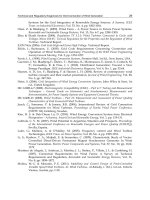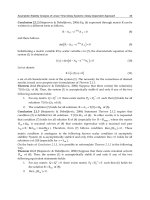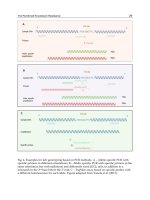Chapter 070. Nutritional Requirements and Dietary Assessment (Part 3) doc
Bạn đang xem bản rút gọn của tài liệu. Xem và tải ngay bản đầy đủ của tài liệu tại đây (109.45 KB, 9 trang )
Chapter 070. Nutritional Requirements
and Dietary Assessment
(Part 3)
Note: This table presents recommended dietary allowances (RDAs) in
bold type and adequate intakes (AIs) in ordinary type. RDAs and AIs may both be
used as goals for individual intake. RDAs are set to meet the needs of almost all
individuals (97 to 98%) in a group. For healthy breastfed infants, the AI is the
mean intake. The AI for other life stage and gender groups is believed to cover
needs of all individuals in the group, but lack of data or uncertainty in the data
prevent being able to specify with confidence the percentage of individuals
covered by this intake.
a
As retinol activity equivalents (RAEs). 1 RAE = 1 µg retinol, 12 µg β-
carotene, 24 µg α-carotene, or 24 µg β-cryptoxanthin. To calculate RAEs from
retinol equivalents (REs) of provitamin A carotenoids in foods, divide the REs by
2. For preformed vitamin A in foods or supplements and for provitamin A
carotenoids in supplements, 1 RE = 1 RAE.
b
As calciferol. 1 µg calciferol = 40 IU vitamin D.
c
In the absence of adequate exposure to sunlight.
d
As α-tocopherol. α-Tocopherol includes RRR-α-tocopherol, the only form
of α-tocopherol that occurs naturally in foods, and the 2R-stereoisomeric forms of
α-tocopherol (RRR-, RSR-, RRS-, and RSS-α-tocopherol) that occur in fortified
foods and supplements. It does not include the 2S-stereoisomeric forms of α-
tocopherol (SRR-, SSR-, SRS-, and SSS-α-tocopherol), also found in fortified foods
and supplements.
e
As niacin equivalents (NE). 1 mg of niacin = 60 mg of tryptophan; 0–6
months = preformed niacin (not NE).
f
As dietary folate equivalents (DFEs). 1 DFE = 1 µg food folate = 0.6 µg of
folic acid from fortified food or as a supplement consumed with food = 0.5 µg of a
supplement taken on an empty stomach.
g
Although AIs have been set for choline, there are few data to assess
whether a dietary supply of choline is needed at all stages of the life cycle, and it
may be that the choline requirement can be met by endogenous synthesis at some
of these stages.
h
Because 10 to 30% of older people may malabsorb food-bound B
12
, it is
advisable for those >50 years to meet their RDA mainly by consuming foods
fortified with B
12
or a supplement containing B
12
.
i
In view of evidence linking inadequate folate intake with neural tube
defects in the fetus, it is recommended that all women capable of becoming
pregnant consume 400 µg from supplements or fortified foods in addition to intake
of food folate from a varied diet.
j
It is assumed that women will continue consuming 400 µg from
supplements or fortified food until their pregnancy is confirmed and they enter
prenatal care, which ordinarily occurs after the end of the periconceptional
period—the critical time for formation of the neural tube.
Source: Food and Nutrition Board, Institute of Medicine—National
Academy of Sciences Dietary Reference Intakes, 2000, 2002, reprinted with
permission. Courtesy of the National Academy Press, Washington, DC.
Table 70-2 Dietary Reference Intakes: Recommended Intakes for
Individuals—Elements
C
M
M
M
P
ife-
Stage
Grou
p
alciu
m,
mg/d
hromi
um,
µg/d
oppe
r,
µg/d
luori
de,
mg/d
odin
e,
µg/d
ron,
mg/
d
agnesi
um,
mg/d
angan
ese,
mg/d
olybde
num,
µg/d
hosph
orus
mg/d
eleni
um,
µg/d
inc,
mg/
d
nfants
0–6
mo
10
0
.2 00 .01 10 .27
3
0
0
.003
2
1
00 5
7–12
mo
70
5
.5 20 .5 30 1
7
5
0
.6
3
2
75 0
hildre
n
1
8
1
1
4
1–3 y
00 1 40 .7 0 0 .2 7 60 0
4–8 y
00
1
5 40 0 0
1
30
1
.5
2
2
5
00 0
ales
9–13
y
300
2
5 00 20
2
40
1
.9
3
4
1
250 0
14–
18 y
300
3
5 90 50 1
4
10
2
.2
4
3
1
250 5 1
19–
30 y
000
3
5 00 50
4
00
2
.3
4
5
7
00 5 1
3
4
2
4
7
31–
50 y
000 5 00 50 20 .3 5 00 5 1
51–
70 y
200
3
0 00 50
4
20
2
.3
4
5
7
00 5 1
>70 y
200
3
0 00 50
4
20
2
.3
4
5
7
00 5 1
emale
s
9–13
y
300
2
1 00 20
2
40
1
.6
3
4
1
250 0
14–
18 y
300
2
4 90 50 5
3
60
1
.6
4
3
1
250 5
19–
30 y
000
2
5 00 50 8
3
10
1
.8
4
5
7
00 5
31–
50 y
000
2
5 00 50 8
3
20
1
.8
4
5
7
00 5
51–
70 y
200
2
0 00 50
3
20
1
.8
4
5
7
00 5
>70 y
200
2
0 00 50
3
20
1
.8
4
5
7
00 5
regna
ncy
2
4
2
5
1
≤18 y
300 9 000 20 7 00 .0 0 250 0 2
19–
30 y
000
3
0 000 20 7
3
50
2
.0
5
0
7
00 0 1
31–
50 y
000
3
0 000 20 7
3
60
2
.0
5
0
7
00 0 1
actati
on
≤18 y
300
4
4 300 90 0
3
60
2
.6
5
0
1
250 0 3
19–
30 y
000
4
5 300 90
3
10
2
.6
5
0
7
00 0 2
31–
50 y
000
4
5 300 90
3
20
2
.6
5
0
7
00 0 2
Note: This table presents recommended dietary allowances (RDAs) in bold
type and adequate intakes (AIs) in ordinary type. RDAs and AIs may both be used
as goals for individual intake. RDAs are set to meet the needs of almost all
individuals (97 to 98%) in a group. For healthy breastfed infants, the AI is the
mean intake. The AI for other life stage and gender groups is believed to cover
needs of all individuals in the group, but lack of data or uncertainty in the data
prevent being able to specify with confidence the percentage of individuals
covered by this intake.
Source: Food and Nutrition Board, Institute of Medicine—National
Academy of Sciences Dietary Reference Intakes, 2000, 2002, reprinted with
permission. Courtesy of the National Academy Press, Washington, DC.
